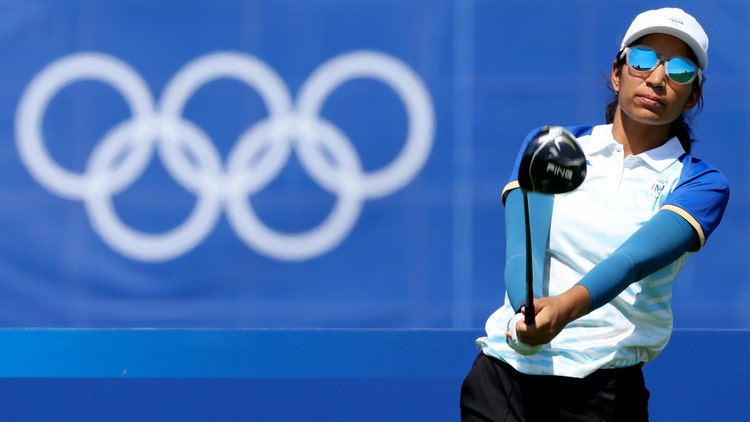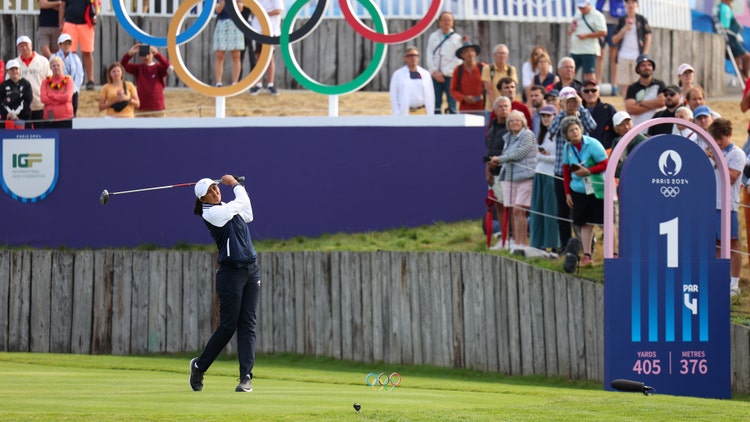
India’s Aditi Ashok, Diksha Dagar start strong in pursuit of Olympic medal at Le Golf National
SAINT-QUENTIN-EN-YVELINES, France – Aditi Ashok knows exactly what it’s like to carry her country on her shoulders.
The India native is playing in her third Olympic Games this week and is looking to find a spot on the podium for the first time, having finished 41st in her debut in Rio and then coming fourth in Tokyo just a few years ago.
Even though she didn’t end up medaling at Tokyo 2020, Ashok’s performance in Japan caused her star to rise to astronomical heights and ignited a new wave of golf fandom in India that the country had never experienced before. It wasn’t an impact that Ashok was expecting to have, but it was an influence that was felt by everyone in her home country, the effects of which she still sees today.
“The golfing population in India probably already knew about me with my (Ladies European Tour) wins and playing on LPGA, but I think all the other people who I've met, who've heard of me or know me, they know me because of the Olympics,” said Ashok, who missed the podium playoff in Tokyo by just one shot. “So, I think it had a really big reach. I'd say cricket is a big sport in India, but apart from that, the Olympics is probably the most followed sporting event in India because it has all these sports and athletics and just the history of the event.”
Ashok’s professional golf counterparts also recognize the impact that she has had on the sport at large, understanding just how much the 26-year-old has done for golf since she turned pro at only 17 years old.
Shubhankar Sharma, who’s a couple of years older than Ashok and is one of the most recognizable male golfers from India, admires what Ashok did at the Tokyo Games in 2021 and knows that her performance at Kasumigaseki Country Club will continue to have implications for years to come on India’s sporting culture.
“It is not just me who is a reference point for future generations,” said Sharma. “Aditi Ashok came close to a medal at the Tokyo Olympics. She finished fourth, and everyone took notice, and that's the power of the Olympic Games. In some respects, it resonates more than a major championship. Everyone knows what the Olympics is. That increases the magnitude of the event and the impact that it can have on young kids.

“In many ways, I think the women's game is progressing at a faster pace back home. You have many more players not only picking up the game as young kids but performing at every level in the junior and amateur categories, and I can see more and more players going on to play golf globally. Aditi is the flag bearer of this.”
While Ashok has plenty of experience as one of India’s top female golfers, her compatriot this week at the Paris Olympics, Diksha Dagar, never expected to be a role model. Not for Indian golf. Not for the Deaf community. Not for anybody, really.
Dagar has lived with hearing loss her entire life, not speaking as a child until she was around five or six years old. A cochlear implant has helped her to communicate more effectively as she has aged, but Dagar still often reads lips to understand what others are saying.
Even though some might consider her deafness to be a detriment, Dagar doesn’t see things that way, as her hearing loss has never appeared to slow her down. Instead of looking at it as a negative, Dagar has chosen to play the hand she was dealt in life and enjoys every opportunity she has to tee it up in a tournament, no matter where she competes, whether that be on the Ladies European Tour or the LPGA Tour or even in the Deaflympics.
Dagar is just grateful to be playing the game at the highest level and having success at it, something few Indian golfers can say they have done on a global scale.
“I haven't expected (to be a role model) because I don't know what's happening around me,” Dagar said. “I have no idea that I'm inspiring people because they are something that I can't see unless they came up to me, then I realized that, yes, I'm inspiring (others).
“For example, I played in the Deaf Olympics in Turkey, and I won a medal there. When I played for a second time at the Deaf Olympics, there was a player who came from another country, and their parents talked to me like, I have been following you since then, and we have made the effort to come here to compete, to see you, to meet you. We wanted to play alongside you at the top, high-level tournaments. That's commendable that you are doing that. I was so happy to hear that.”
This is Dagar’s second Olympics, as the now 23-year-old got a last-minute tap to tee it up in Tokyo after a late player withdrawal in Japan. She ultimately finished in a tie for 50th in the 2020 Games, a performance she hopes to better this week at Le Golf National.
A medal from either Ashok or Dagar would be another huge step in the right direction for Indian golf, and both players had solid starts on Wednesday.
Ashok, who only arrived in Paris on Monday after playing in the Portland Classic last week on the LPGA Tour, kicked off her third Olympic Games with an even-par 72, a respectable first-round showing considering her limited preparation.
She made three birdies and one bogey at Le Golf National before a double bogey on the par-5 18th hole derailed her hopes for an under-par first round, but Ashok just laughed it off in the interview area afterward, knowing that things like that will happen at this tricky Olympic venue.
“I think it was a good day for me because it was tough initially with the wind, and it's tough to judge the yardages and manage the wind, too,” said Ashok. “I started off pretty good, actually. That set the round. Except for the last, I didn't make many mistakes. Overall, a good day.”
Dagar managed to get around Le Golf National in 1-under, carding three birdies on holes 7, 11 and 14 and then closing out her round with a pair of back-to-back bogeys on 17 and 18. It was a frustrating finish for the young talent, who said she made a “silly mistake” on the final hole at Le Golf National, but a strong 71 has bolstered her confidence heading into the next three days just outside of Paris.
“I started very good,” said Dagar. “I found a lot of fairways today. The greens in regulation was very good, and when I had a birdie putt chance, I made some putts. I was going very good until the 16th hole. Unfortunately, on the last two holes, I dropped two shots. It’s okay. Golf can be hard. Sometimes it is in your favor. Some days it is not.”
No medals are ever secured on day one of the women’s Olympic golf competition, but they can be lost by a poor first-round showing.
Ashok and Dagar have room to improve at Le Golf National, particularly in the closing stretch, and will try to clean up those mistakes over the next 54 holes as both athletes work to find a spot on the podium and jumpstart the next surge of golf fandom in their home country of India.